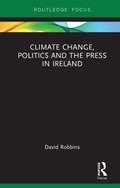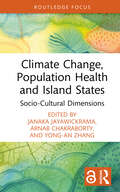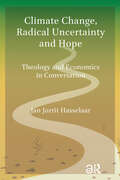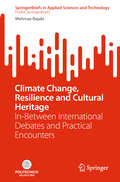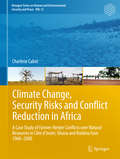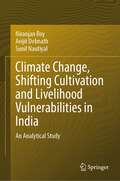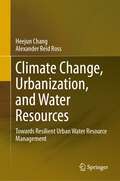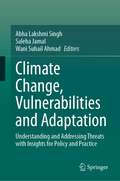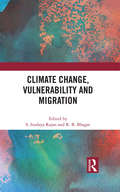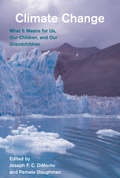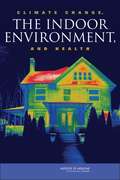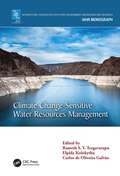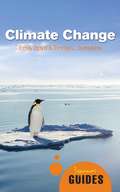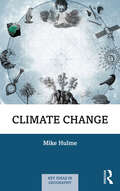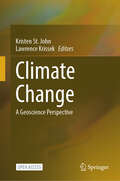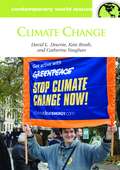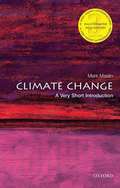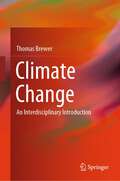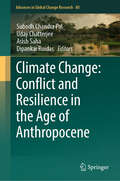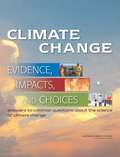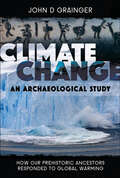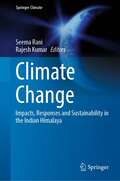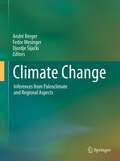- Table View
- List View
Climate Change, Politics and the Press in Ireland (Routledge Focus on Environment and Sustainability)
by David RobbinsMedia coverage of climate change has attracted much scholarly attention because the extent of such coverage has an agenda-setting effect and because the ways in which the coverage is framed can influence public perception of and engagement with the issue. However, certain gaps in our understanding of the processes whereby such coverage is produced remain. The competition among strategic actors to influence media framing strategies is poorly understood, and the perspectives of journalists and editors are largely absent from literature. With a view to advancing our understanding of the "frame competition" around climate change and to presenting the perspectives of journalists regarding climate change as a journalistic topic, this book presents an in-depth case history of media coverage of climate change in Ireland. First, the extent of media attention for climate change is established, and the way in which such coverage is framed is also examined. Through a series of interviews, including rare and privileged access to government ministers, their media advisors, and journalists and editors, the book uncovers the contest to establish a dominant framing. The main objective of this book is to advance our understanding of the contest to establish the dominant framing of climate change in the media discourse. Although focussed on Ireland, its conclusions are of value to those seeking to better understand the dynamics of media coverage of climate change in other contexts. This book will be of great interest to students and scholars of climate change, environmental policy, media and communication studies, and Irish politics.
Climate Change, Population Health and Island States: Socio-Cultural Dimensions
by Arnab Chakraborty Janaka Jayawickrama Yong-An ZhangThis unique collection examines climate change, disasters, and human health in both ‘developed’ and ‘developing’ island nations, highlighting the sociocultural issues in three countries: the UK, Sri Lanka, and Saint Vincent and the Grenadines.Examining how domestic and international policies often disregard the contributions which can be made by poor and marginalised communities, the book demonstrates how traditional ecological knowledge systems, which once enabled effective adaptation to environmental variability, have been systematically marginalised through processes of modernisation and globalisation. Furthermore, the book argues that the colonial model of prevention and responses should be reconsidered, advocating instead for a more inclusive, collaborative approach to climate-health governance – one that meaningfully incorporates local perspectives while addressing structural vulnerabilities to develop equitable, context-specific solutions for island states facing the escalating challenges of climate change and disaster-related health risks.This critical analysis will be of interest to students, scholars, and policymakers in public health, climate change and sustainability, disaster risk reduction, history, anthropology, sociology, and human geography.The Open Access version of this book, available at http://www.taylorfrancis.com, has been made available under a Creative Commons Attribution-Non Commercial-No Derivatives (CC BY-NC-ND) 4.0 license.
Climate Change, Radical Uncertainty and Hope: Theology and Economics in Conversation
by Jan Jorrit HasselaarViews on climate change are often either pessimistic or optimistic. In this book Jan Jorrit Hasselaar discovers and explores a third way, one of hope. A debate within economics on risk and uncertainty brings him to theological questions and the concept of hope in the work of the late Jonathan Sacks—and to a renewed way of doing theology as an account of the good life. What follows is an equal conversation between theology and economics as has hardly been undertaken in recent times. It emerges that hope is not contrary to economic insights, but remarkably compatible with them. Communication between these fields of expertise can open the way for a courageous and creative embrace of radical uncertainty in climate change. A key notion here is that of a public Sabbath, or a ‘workplace of hope’—times and places set aside to cultivate inspiration and mutual trust among all parties involved, enabling them to take concrete steps forward.
Climate Change, Resilience and Cultural Heritage: In-Between International Debates and Practical Encounters (SpringerBriefs in Applied Sciences and Technology)
by Mehrnaz RajabiThis book showcases the cross-disciplinary and “systemic” relationships among climate change, resilience, and cultural heritage. It critically reviews the contemporary international documents and scholarly debates of the climate science, disaster risk management, and heritage fields and reveals that, within the comprehensive point of view, the potential and advances in one field could be instrumentalized in other fields. Moreover, it provides tailor-made considerations and practical recommendatory encounters toward resilient cultural heritage in facing climate change as a “disaster risk driver”. Lastly, the book highlights the significance of the cultural dimension of climate change as well as the global landscape of systemic risk while redefining a new comprehensive and holistic definition of resilience for the heritage field.
Climate Change, Security Risks and Conflict Reduction in Africa: A Case Study of Farmer-Herder Conflicts over Natural Resources in Côte d’Ivoire, Ghana and Burkina Faso 1960–2000 (Hexagon Series on Human and Environmental Security and Peace #12)
by Charlène CabotMillionsof people are already affected by weather-related shocks every year in WestAfrica and climate change is highly likely to increase these threats. In thewake of climate change, rising temperatures, increasingly irregular rainfalland more frequent natural hazards will endanger the ways of life of vulnerablepopulation groups in this region and destabilize their human security. A surgein violence and conflicts could take place. One of the conflict constellationscould be between farmers and herders. These groups are highly vulnerable toclimate change due to their dependence on natural resources Millions of people are already affected by weather-related shocks every year in West Africa and climate change is highly likely to increase these threats. In the wake of climate change, rising temperatures, increasingly irregular rainfall and more frequent natural hazards will endanger the ways of life of vulnerable population groups in this region and destabilize their human security. A surge in violence and conflicts could take place. One of the conflict constellations could be between farmers and herders. These groups are highly vulnerable to climate change due to their dependence on natural resources for their subsistence. Furthermore, they are historically prone to enter into conflict over issues of access to natural resources. However, social, economic and political circumstances fundamentally influence environmental conflicts. There might thus be opportunities to face the societal challenges of climate change in a peaceful way and the political and institutional framework could play an important role in reducing conflict and violence. In order to explore such a path, this study analyses the potential of political factors (policies and institutions) for the reduction of climate-change-induced or aggravated conflicts between farmers and herders. After a theoretical demonstration, a case study of agro-pastoral conflicts in Burkina Faso, Côte d'Ivoire, and Ghana is conducted. theirsubsistence. Furthermore, they are historically prone to enter into conflictover issues of access to natural resources. However, social, economic andpolitical circumstances fundamentally influence environmental conflicts. Theremight thus be opportunities to face the societal challenges of climate changein a peaceful way and the political and institutional framework could play animportant role in reducing conflict and violence. In order to explore such apath, this study analyses the potential of political factors (policies and institutions)for the reduction of climate-change-induced or âe'aggravated conflicts betweenfarmers and herders. After a theoretical demonstration, a case study ofagro-pastoral conflicts in Burkina Faso, Côte d'Ivoire, and Ghana is conducted.
Climate Change, Shifting Cultivation and Livelihood Vulnerabilities in India: An Analytical Study
by Sunil Nautiyal Niranjan Roy Avijit DebnathThis book explores how climate change affects households that rely on shifting cultivation and how to assess their vulnerability. This study looks at micro and macro levels in Indian states with indigenous communities practicing shifting cultivation. The micro-level study has been conducted in 52 villages, with 1469 households covering 7067 population in seven states of India in the Northeastern region. The book covers different topics related to climate change, such as its patterns, impact on households and agriculture, forest management, and the role of indigenous knowledge in mitigation. This research is associated with different sectors like shifting agriculture, forestry sector, climate change and rural development etc. and integrated with large respondents and stakeholders through both direct and focus group discussions. Research scholars, climate activists, institutional and non-institutional organisations, people interested in environmental science, social science and policymakers will find this book very relevant.
Climate Change, Urbanization, and Water Resources: Towards Resilient Urban Water Resource Management
by Alexander Reid Ross Heejun ChangThis book discusses resilient urban water resources management in the context of climate change and ongoing urbanization. Twelve cities worldwide representing different climates and growth stages serve as case studies. Using these case cities, this book first identifies the main water issues, including water demand, floods, and droughts, in relation to the historical development of each city, investigates current strategies for dealing with climate-related water hazards, and explores potential adaptive strategies. The authors draw some common lessons by comparing and contrasting these case studies while acknowledging place-based unique adaptation strategies.
Climate Change, Vulnerabilities and Adaptation: Understanding and Addressing Threats with Insights for Policy and Practice
by Saleha Jamal Abha Lakshmi Singh Wani Suhail AhmadThis contributed volume offers a wide variety of cases exploring how humanity can adapt to a changing climate. The volume features a wide variety of contributions from geographers, primarily in India but with plenty of global cases to provide a broad comparative perspective. A primary goal of this book is to bridge the gap from conceptual and data-driven analysis of climate change and adaptation to practical planning approaches and strategies. The book compiles contributions that address human well-being and environmental effects related to climate change, including analysis and modelling of ecosystem services, socio-ecological research and sustainable governance of ecosystems. Results reported in this book are conducive to a better understanding of the climate emergency, climate-related impacts and adaptation and mitigation strategies. The cases here also provide researchers with new examples of applications of vulnerability assessment methods. The volume offers insights regarding vulnerable areas in India, an exploration of how some regions have coped with these issues, and a discussion of the impacts that public policy has had on vulnerability in the regions studied. The focus on vulnerability will assist decision-makers in and outside India in targeting policies aimed at poverty reduction in agricultural communities as well. Though the cases here primarily focus on India, the methodologies presented here are transferable to many other parts of the world.
Climate Change, Vulnerability and Migration
by S. Irudaya Rajan R. B. BhagatThis book highlights how climate change has affected migration in the Indian subcontinent. Drawing on field research, it argues that extreme weather events such as floods, droughts, cyclones, cloudbursts as well as sea-level rise, desertification and declining crop productivity have shown higher frequency in recent times and have depleted bio-physical diversity and the capacity of the ecosystem to provide food and livelihood security. The volume shows how the socio-economically poor are worst affected in these circumstances and resort to migration to survive. The essays in the volume study the role of remittances sent by migrants to their families in environmentally fragile zones in providing an important cushion and adaptation capabilities to cope with extreme weather events. The book looks at the socio-economic and political drivers of migration, different forms of mobility, mortality and morbidity levels in the affected population, and discusses mitigation and adaption strategies. The volume will be of great interest to scholars and researchers of environment and ecology, migration and diaspora studies, development studies, sociology and social anthropology, governance and public policy, and politics.
Climate Change, second edition: What It Means for Us, Our Children, and Our Grandchildren (American and Comparative Environmental Policy)
by Pamela Doughman Joseph F.C. DiMentoAn updated and accessible account of what science knows about climate change, incorporating the latest scientific findings and policy initiatives.Most of us are familiar with the term climate change but few of us understand the science behind it. We don't fully comprehend how climate change will affect us, and for that reason we might not consider it as pressing a concern as, say, housing prices or unemployment. This book explains the scientific knowledge about global climate change clearly and concisely in engaging, nontechnical language, describes how it will affect all of us, and suggests how government, business, and citizens can take action against it.This completely revised and updated edition incorporates the latest scientific research and policy initiatives on climate change. It describes recent major legislative actions, analyzes alternative regulatory tools including new uses of taxes and markets, offers increased coverage of China and other developing nations, discusses the role of social media in communicating about climate change, and provides updated assessments of the effects of climate change.The book first explains the basic scientific facts about climate change and its global impact. It discusses the nature of scientific consensus and the strong consensus of mainstream science on climate change. It then explores policy responses and corporate actions in the United States and the rest of the world, discusses how the communication of climate change information by journalists and others can be improved, and addresses issues of environmental justice—how climate change affects the most vulnerable populations and regions. We can better tackle climate change, this book shows us, if we understand it.
Climate Change, the Indoor Environment, and Health
by Committee on the Effect of Climate Change on Indoor Air Quality Public HealthThe indoor environment affects occupants' health and comfort. Poor environmental conditions and indoor contaminants are estimated to cost the U. S. economy tens of billions of dollars a year in exacerbation of illnesses like asthma, allergic symptoms, and subsequent lost productivity. Climate change has the potential to affect the indoor environment because conditions inside buildings are influenced by conditions outside them. Climate Change, the Indoor Environment, and Health addresses the impacts that climate change may have on the indoor environment and the resulting health effects. It finds that steps taken to mitigate climate change may cause or exacerbate harmful indoor environmental conditions. The book discusses the role the Environmental Protection Agency (EPA) should take in informing the public, health professionals, and those in the building industry about potential risks and what can be done to address them. The study also recommends that building codes account for climate change projections; that federal agencies join to develop or refine protocols and testing standards for evaluating emissions from materials, furnishings, and appliances used in buildings; and that building weatherization efforts include consideration of health effects. Climate Change, the Indoor Environment, and Health is written primarily for the EPA and other federal agencies, organizations, and researchers with interests in public health; the environment; building design, construction, and operation; and climate issues.
Climate Change-Sensitive Water Resources Management (IAHR Monographs)
by Ramesh S. V. Teegavarapu Elpida Kolokytha Carlos de Oliveira GalvãoThe book provides an overview of climate change-sensitive water resources management with consideration of adaptation approaches, the assessment of climate change impacts, current contemporary management techniques, and ecological responses. Comprehensive assessments and studies from eight countries using innovative approaches that aid water management under evolving climates are documented. Topics ranging from hydrologic design to management and policy responses to climate change are discussed, which demonstrate updated theories that highlight methods, tools, and experiences on the topic of water resources under climate change. The generic approaches discussed, and their applications to different climate change-related problems, make this book appealing to a global readership. The practical and applied methodologies presented in the book and through insightful case studies discussed will provide readers worldwide with ready-to-use information to manage water resources sustainably under evolving climate. This book is ideally suited for water resource managers, scientists, professionals from water management agencies, graduate students, and national laboratory agencies responsible for water and environmental management.
Climate Change: A Beginner's Guide (Beginner's Guides)
by Emily Boyd Emma L TompkinsClimate change is the greatest single problem we face as a planet. This important introduction skilfully guides us through the complex mix of scientific, political, social, and environmental issues to explore the possible futures for our world. Focusing on the fact that the "point of no return" may have already been passed, Boyd and Tompkins highlight the urgent need to start addressing the wide-ranging consequences of our changing climate if we want to avoid catastrophe.
Climate Change: A Case Against Climate Engineering (Key Ideas in Geography)
by Mike HulmeWritten by a leading geographer of climate, this book offers a unique guide to students and general readers alike for making sense of this profound, far-reaching, and contested idea. It presents climate change as an idea with a past, a present, and a future. In ten carefully crafted chapters, Climate Change offers a synoptic and inter-disciplinary understanding of the idea of climate change from its varied historical and cultural origins; to its construction more recently through scientific endeavour; to the multiple ways in which political, social, and cultural movements in today’s world seek to make sense of and act upon it; to the possible futures of climate, however it may be governed and imagined. The central claim of the book is that the full breadth and power of the idea of climate change can only be grasped from a vantage point that embraces the social sciences, humanities, and natural sciences. This vantage point is what the book offers, written from the perspective of a geographer whose career work on climate change has drawn across the full range of academic disciplines. The book highlights the work of leading geographers in relation to climate change; examples, illustrations, and case study boxes are drawn from different cultures around the world, and questions are posed for use in class discussions. The book is written as a student text, suitable for disciplinary and inter-disciplinary undergraduate and graduate courses that embrace climate change from within social science and humanities disciplines. Science students studying climate change on inter-disciplinary programmes will also benefit from reading it, as too will the general reader looking for a fresh and distinctive account of climate change.
Climate Change: A Geoscience Perspective
by Lawrence Krissek Kristen St. JohnThis open access book on climate change assesses past climatic change from a geoscience perspective and directly and effectively addresses common misconceptions on climate and climate change. A geoscience perspective on the multiple causes, rates, and consequences of climate change is essential context to assess modern climate change and our role in it, as well as forecasting future climate conditions. Yet, most textbooks on climate change focus only on the very recent past (e.g., last century), are not sufficiently engaging for non-scientists, or explore paleoclimate science at a level too challenging for introductory students. In addition, a wide range of misconceptions and confusion exists in the general public about climate change. Correcting misconceptions is an essential aspect of education, but educational research has shown that it is challenging to achieve. This textbook includes introductions to each thematic Part, that directly identify relevant misconceptions and refute them with clear, concise messages (i.e., learning goals) that are grounded in science and expanded on in the supporting chapters. Such refutation-style approaches have been shown to be effective at addressing misconceptions. The book offers a clear trajectory of fundamental climate science concepts, which are most beneficially combined to provide a valuable geoscience perspective on the causes, rates, and consequences of climate change. It frames the collection of climate science chapters with impactful, relevant social science context: starting the book with a chapter that explores the reasons behind the disconnect between the scientific and public understanding of climate change, and ending the book with a discussion of the intersection of ethics and climate change. Short topical expansions or excursions are included as “boxes” within selected chapters. This book will serve as a basic resource for learning about the lessons that the paleoclimate record offers to evaluate the seriousness of modern and future climate change.
Climate Change: A Multidisciplinary Approach
by William James BurroughsProviding a concise, up-to-date presentation of current knowledge of climate change and its implications for society as a whole, this new edition has been thoroughly updated and extended to include the latest information. The text describes the components of the global climate, considers how the many elements of climate combine to define its behaviour, and reviews how climate change is measured. The author discusses how the causes of climate change can be related to the evidence of change, and modelled to predict future changes. This book is ideally suited for introductory courses in meteorology, oceanography, environmental science, earth science, geography, agriculture and social science. It contains review questions at the end of each chapter to enable readers to monitor their understanding of the materials covered. This book should appeal to an audience with a keen interest in all aspects of the climate change debate.
Climate Change: A Reference Handbook
by David Downie Kate Brash Catherine VaughanEnvironmental activists provide a reference summarizing the climate science and policy, historical developments, current controversies and debates, and proposed solutions. They also profile important people and organizations, identify publications and Web sites with more information, and provide a chronology and texts of relevant documents.
Climate Change: A Very Short Introduction (Very Short Introductions)
by Mark MaslinClimate change is one of the few scientific theories that makes us examine the whole basis of modern society. It is a challenge that has politicians arguing, sets nations against each other, queries individual lifestyle choices, and ultimately asks questions about humanity's relationship with the rest of the planet. The latest Intergovernmental Panel on Climate Change (IPCC) report states that the evidence for climate change is unequivocal; with evidence over the last 100 years of a 0.8°Celsius (C) rise in global temperatures and a 22 centimetres (cm) rise in sea level. <P><P> Climate change challenges the very way we organize our society. Not only does it challenge the concept of the nation-state versus global responsibility, but the short-term vision of our political leaders. Climate change also needs to be seen within the context of the other great challenges of the 21st century: global poverty, population growth, environmental degradation, and global security. To meet these 21st century challenges we must change some of the basic rules of our society, to allow us to adopt a much more global and long-term approach, and in doing so, develop a win-win solution that benefits everyone.
Climate Change: An Interdisciplinary Introduction
by Thomas BrewerThis textbook introduces and explains the issues around climate change and its mitigation. It includes topics across disciplines and can be used as a single-volume text by students studying a range of subjects. Among the topics included are: ·How to adopt significant mitigation measures now to avoid the most catastrophic long-term consequences of climate change.·Reducing the rates of highly potent, short-lived emissions of methane gas and black carbon particulates—reductions that are necessary to meet the temperature targets of the Paris Agreements.·Implementing wide-ranging adaptation measures to reduce the deaths and economic costs of extreme heat waves, droughts, wildfires, hurricanes, and floods.·Recognizing the unusually rapid warming in the Arctic, which is disrupting weather patterns in the northern hemisphere and currents in the Atlantic Ocean, causing world-wide sea-level rise, and also causing methane leaks in the Arctic region—leaks that could eventually lead to irreversible global warming consequences. Meeting these challenges effectively requires action by both governments and businesses. The book examines the national and local governmental policies—and business practices—that are needed in sector-specific chapters. An objective of the book is to inform readers about specific problems resulting from climate change—and the wide range of potential government policies and business practices, changes in technologies, and changes in public attitudes and actions that can reduce the emissions and otherwise lessen their impacts. Indeed, a central message is that understanding the issues posed by climate change requires no less than an understanding of climate science, micro- and macro-economics, technologies for mitigation and adaptation measures, as well as politics and law at many governmental levels from local to global. The author has included short case studies that illustrate and integrate multiple analytic perspectives. The book is therefore appropriate for students, professionals, and general audiences with wide-ranging interests and backgrounds.
Climate Change: Conflict and Resilience in the Age of Anthropocene (Advances in Global Change Research #80)
by Uday Chatterjee Subodh Chandra Pal Asish Saha Dipankar RuidasThis book illustrates a geospatial technology approach to data mining techniques, data analysis, modelling, risk assessment and visualization and management strategies in many elements of natural and societal hazards. This book delves into cutting-edge techniques based on open-source software and R statistical programming, Google Earth Engine and modelling in modern artificial intelligence techniques, with a particular emphasis on recent trends in data mining techniques and robust modelling in water resource crisis-related hazards. Furthermore, this book also discusses how to manage water resources at various local, regional and international levels while incorporating environmental considerations. This book contains works that address the connection between climate change, extreme events and resilience. These works include those that identify and evaluate policies, quantify the effects of public interventions, climate change on extreme events, describe the decision-making process and its role in modelling for resilience. This book's subjects be of interest to earth and environmental scientists, professionals and authorities. This book focuses at geospatial modelling and climate change management. A relationship between three technologies, including remote sensing (RS), geographic information systems (GIS) and the R programming environment, is acknowledged as particularly effective in this regard. This book, on the other hand, serves as a practical guide to identify the most recent breakthroughs in geospatial and geostatistical approaches and their application in the field of subsurface water-induced hazards throughout the world. This book is specifically designed to serve the community of Undergraduates, Postgraduates and Researchers, Policymakers, Environmentalists, Natural Hazards and Disasters Management, NGOs, Corporate Sectors, Social Scientists, and Government Organizations in the fields of Environmental Sciences, Geography, Hydrology, Natural Hazards, Geospatial Sciences, Remote Sensing & GIS, Agriculture, Crop-Science, Forestry, Soil Science, Agronomy, Humanistic & Social Sciences and so on.
Climate Change: Evidence, Impacts, and Choices
by National Research CouncilWhat is climate? Climate is commonly thought of as the expected weather conditions at a given location over time. People know when they go to New York City in winter, they should take a heavy coat. When they visit the Pacific Northwest, they should take an umbrella. Climate can be measured as many geographic scales - for example, cities, countries, or the entire globe - by such statistics as average temperatures, average number of rainy days, and the frequency of droughts. Climate change refers to changes in these statistics over years, decades, or even centuries. Enormous progress has been made in increasing our understanding of climate change and its causes, and a clearer picture of current and future impacts is emerging. Research is also shedding light on actions that might be taken to limit the magnitude of climate change and adapt to its impacts. Climate Change: Evidence, Impacts, and Choices is intended to help people understand what is known about climate change. First, it lays out the evidence that human activities, especially the burning of fossil fuels, are responsible for much of the warming and related changes being observed around the world. Second, it summarizes projections of future climate changes and impacts expected in this century and beyond. Finally, the booklet examines how science can help inform choice about managing and reducing the risks posed by climate change. The information is based on a number of National Research Council reports, each of which represents the consensus of experts who have reviewed hundreds of studies describing many years of accumulating evidence.
Climate Change: How Our Prehistoric Ancestors Responded to Global Warming
by John D. GraingerHow prehistoric humans coped with the end of the last Ice Age—and catastrophic global warming.Global warming is among the most urgent problems facing the world today. Yet many commentators, and even some scientists, discuss it with reference only to the changing climate of the last century or so. John Grainger takes a longer view and draws on the archaeological evidence to show how our ancestors faced up to the ending of the last Ice Age, arguably a more dramatic climate change crisis than the present one. Ranging from the Paleolithic down to the development of agriculture in the Neolithic, the author shows how human ingenuity and resourcefulness allowed them to adapt to the changing conditions in a variety of ways as the ice sheets retreated and water levels rose. Different strategies, from big game hunting on the ice, nomadic hunter gathering, sedentary foraging, and finally farming, were developed in various regions in response to local conditions as early man colonized the changing world. The human response to climate change was not to try to stop it, but to embrace technology and innovation to cope with it.
Climate Change: How Our Prehistoric Ancestors Responded to Global Warming
by John D. GraingerHow prehistoric humans coped with the end of the last Ice Age—and catastrophic global warming.Global warming is among the most urgent problems facing the world today. Yet many commentators, and even some scientists, discuss it with reference only to the changing climate of the last century or so. John Grainger takes a longer view and draws on the archaeological evidence to show how our ancestors faced up to the ending of the last Ice Age, arguably a more dramatic climate change crisis than the present one. Ranging from the Paleolithic down to the development of agriculture in the Neolithic, the author shows how human ingenuity and resourcefulness allowed them to adapt to the changing conditions in a variety of ways as the ice sheets retreated and water levels rose. Different strategies, from big game hunting on the ice, nomadic hunter gathering, sedentary foraging, and finally farming, were developed in various regions in response to local conditions as early man colonized the changing world. The human response to climate change was not to try to stop it, but to embrace technology and innovation to cope with it.
Climate Change: Impacts, Responses and Sustainability in the Indian Himalaya (Springer Climate)
by Rajesh Kumar Seema RaniThis book provides the world community with the most up-to-date and comprehensive scientific and technical knowledge based on climate change impact assessment, adaptation and mitigation strategies in the Indian Himalayan region. It identifies major issues related to climate change on environmental sustainability, focusing on impact measurement, policy, adaptation and mitigation strategies at national, regional and local scales. There is a need to strengthen the global response in order to cope with the threat of climate change. The main objective of this book is to update the understanding of scientific analysis and to promote evidence-based policy formulation at regional and local levels. This book on climate change is used as a reference material to climate change for new learners interested in the mountainous region of the Indian Himalayas. This comprehensive book covers a wide range of potential research areas including climate change scenarios, science and its applications, adaptation to climate change theory and assessment, water resources, agriculture, human health, forest, biodiversity, ecosystems, indigenous knowledge, etc.
Climate Change: Inferences from Paleoclimate and Regional Aspects
by André Berger Djordje Sijacki Fedor MesingerExperts in climate and water sciences from Canada, the United States, Brazil, Denmark, Germany, Belgium, France, Serbia, and other European countries and the UNESCO gathered at the Serbian Academy of Sciences and Arts on the occasion of the 130th birthday anniversary of the geophysicist Milutin Milankovitch. The collection of their presentations is opened by an update on the climate situation after the Fourth Assessment Report of the Intergovernmental Panel on Climate Change. Further topics include various issues of paleoclimatology, in particular as it helps reduce uncertainties from which prospects for climate change suffer; ecohydrology and climate change at the watershed scale; and regional climate models, which are discussed in terms of both their improved modeling and their use in studies of a polynya in the Antarctica and expected changes in the Mediterranean region.
